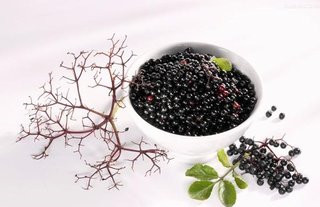Elderberry for cold
As we all know, there is no specific medicine for viral infection, and it is generally more to rely on the body’s immune system to overcome it, not drugs. Under such a premise, natural anti-virus products will usher in new market opportunities. At present, most of the known natural health raw materials are mainly anti-oxidation functions, and the direct response to cold viruses such as elderberry extract is rare.
What is elderberry?
It is a shrub widely planted in Europe, North Africa, Central and Western Asia. Its medicinal parts are leaves, fruits and flowers. Nowadays, It is the fruit of berry. The most important ingredient is polyphenolic compounds, including anthocyanins and flavonoids. Among them, anthocyanins are the main reason for the attractive red, purple and violet of elderberry and other fruits and vegetables, and also a natural pigment widely found in nature. It also contains vitamins, minerals, amino acids and sterols. The identifiable substances include the following vitamin A, vitamin C, and iron. In addition to the nutrient content, more and more effects of elderberry are found, such as resistance. Virus and improve immunity.
An interesting flight test
At the 21st International General Medical Conference, scientists published a trial on Elderberry: Its extract is good for respiratory health, effectively suppressing the flu virus and significantly reducing the number of colds and reducing colds. symptom.
The study conducted a two-year, randomized, double-blind, placebo-controlled flight trial of Elderberry elderberry extract for 312 long-distance passengers from Sydney, Australia to Berlin, Germany. Proof of the effectiveness of elderberry in combating influenza viruses.
How does elderberry fight against flu?
A cold is a syndrome of upper respiratory tract infection caused by a virus. When an influenza virus invades the human body, hemagglutinin (HA) fuses into the host cell via the cell membrane. Neuraminidase (NA) is released from infected cells, assisting the influenza virus to enter the cell to replicate and spread out. It is rich in bioflavonoids and anthocyanins, which can inhibit the hemagglutinin of the virus and the neuraminidase activity that destroys the cell membrane, thus preventing virus invasion and spread. At present, many anti-influenza drugs are also researched and developed with NA protease as a target, and the virus cannot be diffused from the host cells by inhibiting the activity of the NA protease.








Leave A Comment